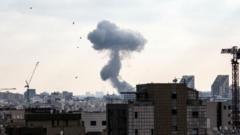The U.S. military conducted strikes on Iranian nuclear facilities, citing significant damages, as fears of escalation loom amid calls for restraint from regional allies.
**U.S. Strikes Iranian Nuclear Sites Amid Regional Tensions**

**U.S. Strikes Iranian Nuclear Sites Amid Regional Tensions**
U.S. military action aims to degrade Iran's nuclear capabilities while regional leaders express mixed reactions.
June 22, 2025, saw the U.S. military launch a series of coordinated strikes against three critical Iranian nuclear sites. Officials from the Pentagon confirmed that facilities in Fordo, Natanz, and Isfahan experienced "severe damage," although it remains unclear whether Iran's nuclear capabilities were entirely neutralized. President Trump characterized the strikes as a decisive step, stating they were intended to compel Tehran to abandon its nuclear ambitions. Vice President JD Vance reiterated the strikes were aimed not at the Iranian state itself but specifically at its nuclear program.
Despite the U.S. portraying the attack as a discrete military action, it raised alarm bells across the Middle East. Many Gulf states, which host U.S. military personnel, issued statements reflecting concern over potential Iranian reprisals. Saudi Arabia described the situation as requiring "restraint," while Oman condemned the strikes as a violation of international law. Notably, regional countries maintained a cautious tone, balancing their rhetoric to avoid alienating the U.S., their key strategic partner.
Iran responded defiantly, with government spokespersons asserting their right to retaliate while threatening U.S. military bases in the region—a vulnerability they claim the U.S. had overlooked. This looming threat heightened tensions, prompting countries with American military installations to reassess their security and readiness.
The aftermath of the U.S. strikes has not only stirred fears of a broader conflict but has also created profound anxiety among Iranian civilians, who are bracing for further instability. Reports indicate that life in Iran has already been severely impacted, with casualties and injuries reported since the beginning of the hostilities. Additionally, the Iranian Health Ministry indicated that while attacks on nuclear facilities didn't cause radiation leaks, they prompted a surge in casualties amidst the ongoing war efforts against Israel and U.S. military involvement.
Amid these escalating tensions, U.S. diplomacy efforts remain tenuous. The response from lawmakers in Washington underscores a division over military strategy, with some Republicans backing Trump's decision while others voiced deep concerns regarding its legality without congressional approval. Internationally, the United Nations Security Council scheduled an emergency meeting to address the unfolding crisis following Iran's request for condemnation of the U.S. actions.
As Israel's military continues its strikes amid Iranian missile responses, the situation remains fragile, with analysts warning of potential long-term ramifications for both the U.S. and Iran's broader regional aspirations. The question now lingers: will diplomatic channels ever reopen in the wake of this military confrontation, or are both nations racing towards an inevitable further escalation?
Despite the U.S. portraying the attack as a discrete military action, it raised alarm bells across the Middle East. Many Gulf states, which host U.S. military personnel, issued statements reflecting concern over potential Iranian reprisals. Saudi Arabia described the situation as requiring "restraint," while Oman condemned the strikes as a violation of international law. Notably, regional countries maintained a cautious tone, balancing their rhetoric to avoid alienating the U.S., their key strategic partner.
Iran responded defiantly, with government spokespersons asserting their right to retaliate while threatening U.S. military bases in the region—a vulnerability they claim the U.S. had overlooked. This looming threat heightened tensions, prompting countries with American military installations to reassess their security and readiness.
The aftermath of the U.S. strikes has not only stirred fears of a broader conflict but has also created profound anxiety among Iranian civilians, who are bracing for further instability. Reports indicate that life in Iran has already been severely impacted, with casualties and injuries reported since the beginning of the hostilities. Additionally, the Iranian Health Ministry indicated that while attacks on nuclear facilities didn't cause radiation leaks, they prompted a surge in casualties amidst the ongoing war efforts against Israel and U.S. military involvement.
Amid these escalating tensions, U.S. diplomacy efforts remain tenuous. The response from lawmakers in Washington underscores a division over military strategy, with some Republicans backing Trump's decision while others voiced deep concerns regarding its legality without congressional approval. Internationally, the United Nations Security Council scheduled an emergency meeting to address the unfolding crisis following Iran's request for condemnation of the U.S. actions.
As Israel's military continues its strikes amid Iranian missile responses, the situation remains fragile, with analysts warning of potential long-term ramifications for both the U.S. and Iran's broader regional aspirations. The question now lingers: will diplomatic channels ever reopen in the wake of this military confrontation, or are both nations racing towards an inevitable further escalation?























